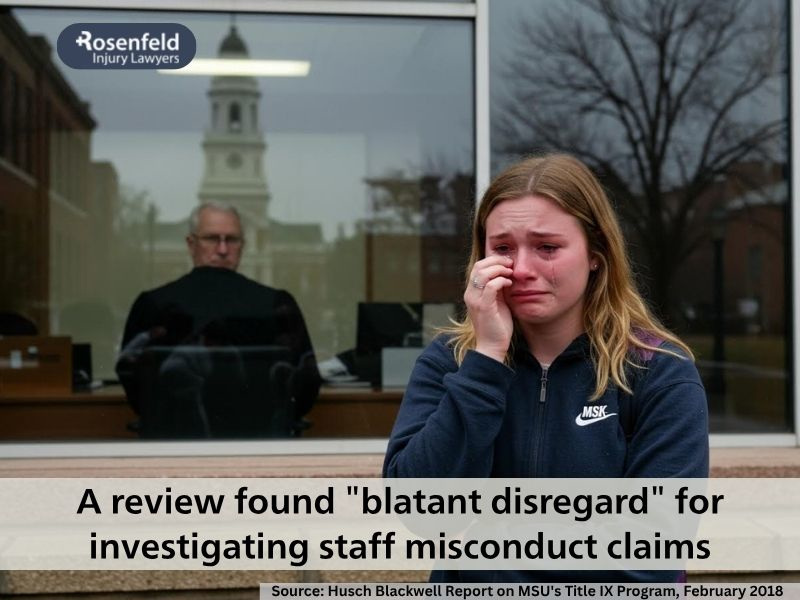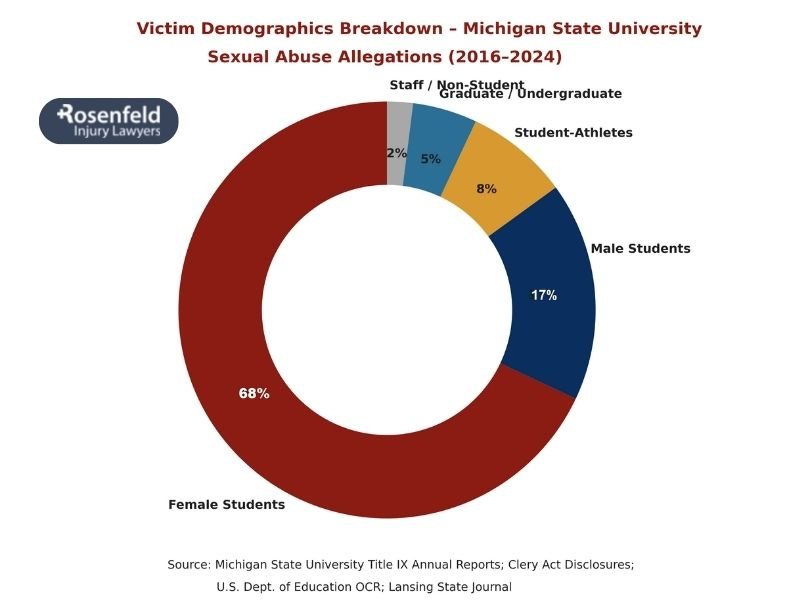Michigan State University Sexual Abuse Lawsuits
Compensation for Victims of Sexual Assault at MSU
The Michigan State University sexual abuse crisis has exposed one of the most disturbing patterns of institutional failure in higher education. From the Nassar scandal to widespread reports of sexual misconduct on campus, MSU has faced repeated accusations that it failed to properly investigate complaints, protect students, and hold offenders accountable.
Surveys show thousands of MSU students have experienced sexual assault or violence in recent years, and multiple investigations highlight deep flaws in MSU’s handling of these crimes.
This article explores the scope of the problem, from MSU’s campus climate statistics to the historic Larry Nassar case, explains the laws that govern sexual assault claims against universities, Michigan’s statute of limitations, and the types of damages the affected may recover in court.
At Injury Lawyer Team, we focus on helping victims of sexual assault pursue accountability. Our sexual abuse lawyers provide resources and support and guide survivors through the legal process.

MSU Sexual Assault Allegations
Sexual Misconduct Beyond the Nassar Scandal
While the Larry Nassar scandal remains the most widely known in recent years, sexual assault allegations at Michigan State University have extended far beyond that one case.
Scope of Reporting
MSU’s campus survey gathered responses from over 15,000 students, faculty, and staff, offering a comprehensive view of campus climate, resource awareness, and experiences with sexual violence.
Prevalence of Sexual Assault and Harassment
Over 4,000 undergraduate women at Michigan State University reported being sexually assaulted during the 2018–19 academic year.
Among undergraduate women:
- 13% experienced sexual assault that year
- 27.3% reported assault since enrolling at MSU
- 38.9% reported lifetime prevalence of abuse
Campus Comparison
MSU’s reported 13% annual rate for undergraduate women aligns with the 10.3% average across other surveyed schools (ranging 4.2–20%). Long-term rates at MSU (27% since enrollment, 39% lifetime) are slightly above averages reported elsewhere.
Harassment & Demographic Disparities
Nearly 2/3 of undergraduate women and significant shares of other student groups at MSU responded that they experienced sexual harassment in 2018–19: ~66% of undergrad females, ~50% of women grad/professional students, ~42% of undergrad males, ~32% of men grad/professional students.
Marginalized groups at MSU (e.g., women of color, individuals with disabilities, LGBTQ+) reported higher rates of sexual assault and harassment.
Campus Climate & Resource Awareness
Male students and faculty were less concerned and viewed the climate more positively than female students and faculty, especially women in graduate and professional programs.
Most community members reported awareness of Michigan State’s resources, policies, and training related to relationship violence and sexual misconduct—but online training was viewed as less effective than in-person school sessions.
Reporting Rates
In MSU’s survey, around 20% of rape incidents and 4.6% of sexual battery incidents involving undergraduate women were reported or disclosed to an MSU office.
By contrast, national comparison data showed 12.5% of rape and 4.3% of sexual battery incidents were reported to any official, indicating MSU’s disclosure rates were relatively higher.
Larry Nassar Case
The Dr. Larry Nassar case, a former Michigan State University osteopathic physician and USA Gymnastics team doctor, tragically exemplifies deep institutional failure. Over 300 former patients came forward with allegations that Nassar sexually abused them under the guise of medical treatment.
Key legal and financial fallout of the Nassar case:
- Michigan State University settled with victims for approximately $500 million, covering more than 300 women and girls.
- As a result of several gymnastics team sexual abuse lawsuits, USA Gymnastics and the U.S. Olympic & Paralympic Committee agreed to a combined settlement of around $380 million.
- The U.S. Justice Department reached a $138.7 million settlement with over 100 survivors, addressing failures by the FBI to promptly investigate emerging allegations.
Collectively, these settlements form a nearly $1 billion compensation fund for Nassar’s victims.
Criminal convictions:
- After admitting to child pornography charges and evidence tampering in July 2017, Nassar received a 60-year federal prison sentence that December.
- The following year, Michigan courts handed down two more terms for sexual assault on patients at MSU: in January 2018, he was given 40 to 175 years in Ingham County for seven counts, and in February 2018, an additional 40 to 125 years in Eaton County for three more counts.
Institutional accountability extended beyond doctor sexual abuse lawsuits and Nassar himself, as MSU’s handling of the scandal was far from ideal and involved other faculty members:
- William Strampel, former dean of MSU’s osteopathic medicine program and Nassar’s supervisor, was convictedin 2019 and received an 11-month jail sentence for misconduct in office and an additional year for two counts of willful neglect of duty, exposing his role in hindering investigations.
- Kathie Klages, gymnastics team coach, was accused and convicted on charges of lying to police regarding her knowledge of Nassar’s abuse in 2018 (though eventually vacated on appeal in 2022).
- Lou Anna Simon, former university president, faced criminal charges (accused of two felonies and two misdemeanors) related to her handling of the MSU scandal and investigative process, though her case was later dismissed.

What Laws Govern Sexual Assault Claims Against Michigan State University?
Title IX of the Education Amendments of 1972
Title IX prohibits sex-based discrimination in federally funded schools and requires institutions like MSU to promptly address sexual harassment, assault, and violence. Survivors can seek redress through criminal charges, civil lawsuits, or by filing complaints with the Department of Education if MSU failed to properly perform the investigative process.
Clery Act
In addition to Title IX, the Clery Act (Jeanne Clery Disclosure of Campus Security Policy and Campus Crime Statistics Act), a federal statute codified at 20 U.S.C. § 1092, with implementing regulations in the U.S. Code of Federal Regulations at 34 CFR 668.46, requires universities to disclose campus crime statistics, issue timely warnings, and publish annual security reports.
In 2019, Michigan State was fined $4.5 million, the largest Clery penalty at the time, for its responsibility in mishandling reports tied to the Nassar scandal.
Michigan mirrors these requirements in MCL § 388.1841b, ensuring public universities comply with Clery-style reporting under both federal and state law.
How Long Do Victims Have to File a Sexual Assault Lawsuit in Michigan?
Criminal Charges
The statute of limitations for sexual assault in Michigan depends on the type of offense, the survivor’s age, and the identity of the perpetrator. Under Theresa Flores’s Law (MCL § 767.24), Michigan extended deadlines for prosecuting sexual crimes:
- No limit for first-degree criminal sexual conduct, life-punishable assaults, or trafficking minors.
- 25 years for trafficking and exploitation.
- 10 years, or until the survivor turns 21, for many child-related assaults.
- 6 years for some adult cases.
Civil Claims
Under MCL § 600.5805(6), survivors have 10 years from the date of the assault to file a civil lawsuit for damages, even if no criminal charges are brought or no conviction is secured.
For abuse occurring during childhood, the statute is extended: survivors can typically file until age 28 or within 3 years of discovering the harm and its link to the abuse. This discovery rule is vital for those who only process or recognize the impact of their traumatic experience years later or need more time for investigation to uncover evidence.
Pending Legislation:
Michigan lawmakers are working to expand protections further through the proposed Justice for Survivors Act (SB 257–SB 261, 2025 Session).
Key reforms include:
- Extending civil filing limits to 10 years after accrual, until age 42, or 7 years after discovery, whichever is later.
- Allowing unlimited civil claims if the abuser has been criminally convicted.
- Stripping governmental immunity from universities and schools that negligently hired or failed to act against abusive employees.
- Creating revival windows for time-barred claims and expanding accountability measures.
If passed, this legislative package would greatly broaden opportunities for survivors of MSU sexual assault and other cases to seek compensation and hold institutions responsible.
What Damages Can Sexually Assaulted Survivors Recover?
Survivors of Michigan State sexual abuse and other assaults can seek the following damages:
Economic damages may cover medical treatment, trauma-informed counseling, lost wages or reduced earning capacity, and additional educational or housing costs if a student must transfer or withdraw.
Non-economic damages include pain, suffering, PTSD, loss of enjoyment of life, damaged relationships, and reputational harm, such as harassment or retaliation on school grounds.
In especially serious cases—like repeated rape, cover-ups, or deliberate inaction and lack of investigation—courts may award punitive damages to punish wrongdoers and deter future misconduct. Such damages have been critical since MSU failed to properly handle the Nassar investigative process and ensure accountability.

Sexual Assault Settlements & Verdicts Recovered by Our Law Firm
At Injury Lawyer Team, we’ve secured compensation for victims of sexual assault across Michigan. These recoveries show how accountability and survivor care drive case outcomes.
$15,000,000 Settlement – Boys Abused by Coach
Several boys were groomed and assaulted by a private coach while administrators ignored complaints. The long-term damage and institutional negligence led to a $15 million settlement.
$1,160,000 Settlement – Teen Assaulted in Detention
A teen was assaulted by a guard in a youth detention center with poor hiring and supervision. Ongoing PTSD and disrupted education contributed to a $1.16 million settlement.
$1,000,000 Recovery – Abuse in After-School Program
A young man was abused by a volunteer, where no background checks were in place. Lingering trauma and program negligence resulted in a $1 million recovery.
These Michigan sexual abuse lawsuits demonstrate that while no settlement erases the harm, financial compensation helps fund treatment, restore dignity, and hold institutions accountable.
How Injury Lawyer Team Can Help
Sexual assault cases are complex and emotionally difficult. Survivors are concerned as they often face powerful schools, faculty members, confusing investigations, lack of support, and lasting hurt.
At Injury Lawyer Team, our experienced sexual abuse lawyer can provide justice through compassionate guidance, thorough investigation, and aggressive representation against abusers and negligent organizations. We work on a contingency fee basis, so you have no responsibility for paying for anything unless we win.
If you or a loved one has been sexually assaulted at MSU, contact us today for a free, confidential consultation and take the first step toward healing.
All content undergoes thorough legal review by experienced attorneys, including Jonathan Rosenfeld. With 25 years of experience in personal injury law and over 100 years of combined legal expertise within our team, we ensure that every article is legally accurate, compliant, and reflects current legal standards.








